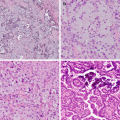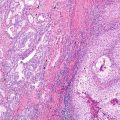© Springer International Publishing AG 2018
Philip T. Cagle, Timothy Craig Allen, Mary Beth Beasley, Lucian R. Chirieac, Sanja Dacic, Alain C. Borczuk, Keith M. Kerr, Lynette M. Sholl, Bryce Portier and Eric H. Bernicker (eds.)Precision Molecular Pathology of Lung CancerMolecular Pathology Libraryhttps://doi.org/10.1007/978-3-319-62941-4_1818. Prognostic Biomarkers in Lung Cancer
(1)
University of Pittsburgh Medical Center, Pittsburgh, PA, USA
Keywords
PrognosisBiomarkersLung cancerALK
The prognostic significance of ALK rearrangement in lung adenocarcinoma is controversial. The European Thoracic Oncology Platform Lungscape project has demonstrated better overall survival (OS) in patients with surgically resected lung adenocarcinoma whose tumors were considered ALK positive either by ALK immunohistochemistry or ALK FISH [1]. In contrast, study in Asian patients, never smokers, with ALK-positive surgically resected lung adenocarcinoma showed worse disease-free survival (DFS) [2]. This sharp difference could be related to the different ethnicity of study population. The prognostic role of ALK was also reported in patients with advanced NSCLC who were not candidate for surgical treatment. Patients with ALK-positive NSCLC showed improved survival after radiotherapy for brain metastases compared with EGFR, KRAS, or wild-type tumors. The median OS for ALK-positive patients was 26.3 months, while patients with EGFR, KRAS, or wild-type tumors showed 13.6, 5.7, and 5.5 months of OS, respectively [3]. Subsequent treatment with targeted therapy resulted in further improvement in OS.
BRAF
In contrast to other tumors, non-V600E BRAF mutations represent almost 50% of all BRAF mutations in lung cancer. The prognostic significance of BRAF mutations in lung cancer is still uncertain, because of the limited data. BRAF mutations may coexist with other mutations such as mutations in EGFR, KRAS, and PIK3CA genes. It has been shown that patients with these coexistent mutations have shorter OS than patients with BRAF mutations only [4]. Most of the published studies failed to show any prognostic significance of BRAF in NSCLC [5–8].
EGFR
To date, the prognostic value of EGFR mutations in NSCLC is controversial. Several studies have shown longer survival in surgically treated patients with EGFR-mutated lung carcinomas when compared to EGFR wild type, regardless of subsequent treatments [9–12]. Other studies and meta-analysis showed no prognostic value of EGFR status in surgically treated lung carcinomas [13–16].
Recently published updates on LUX-Lung3 and LUX-Lung6 trials showed that patients with exon 19 deletion treated with afatinib have a better OS when compared to platinum-chemotherapy subgroup [17]. It has been known from prior retrospective studies and a meta-analysis that all of the EGFR-TKIs are more active in patients with exon 19 deletions than in L858R mutations, but the LUX-Lung studies were the only ones that prospectively showed an OS benefit [18, 19].
The T790M mutations most frequently occur in patients who initially responded to EGFR-TKI treatment but may also occur in EGFR-TKI-naïve patients. The prognostic significance seems to be different depending on the EGFR-TKI treatment status. It has been suggested that patients with pretreatment T790M have shorter PFS when treated with EGFR-TKIs [20–22]. However, other studies showed potential positive prognostic value in post-TKI setting [23, 24].
KRAS
Many retrospective studies reported correlation between KRAS mutations and a poor overall survival in patients with resected NSCLC [25]. A meta-analysis of more than 53 retrospective studies identified KRAS mutations as a negative prognostic factor [26, 27]. However, a recent pooled analysis including four trials comparing platinum-based adjuvant chemotherapy to observation in early-stage resected NSCLC has shown that KRAS mutation status is not significantly prognostic [28].
ROS1
MET
References
1.
2.
3.
Mak KS, Gainor JF, Niemierko A, Oh KS, Willers H, Choi NC, et al. Significance of targeted therapy and genetic alterations in EGFR, ALK, or KRAS on survival in patients with non-small cell lung cancer treated with radiotherapy for brain metastases. Neuro-Oncology. 2015;17(2):296–302.CrossrefPubMed
Stay updated, free articles. Join our Telegram channel

Full access? Get Clinical Tree





